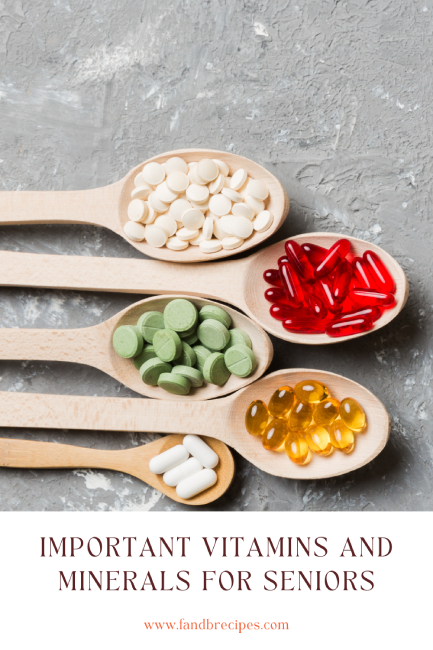Important Vitamins and Minerals for Seniors
A healthy diet is important for seniors to help prevent diseases and enhance well-being. Eating a variety of different foods will help you get all the nutrients needed for good health. Certain nutrients like vitamins and minerals are especially important for older adults.
Life insurance is also crucial for older adults to help cover final expenses and give your family peace of mind. Getting proper coverage at a good rate is important for all seniors.
We’ll go over some important vitamins and minerals for seniors as well as discuss the importance of life insurance for older adults.
The Importance of Life Insurance for Seniors
Proper life insurance is important to help protect your family’s finances if something were to happen to you. It’s never too late to buy a final expense life insurance policy, so make sure you understand the best life insurance for seniors over 60.
A life insurance policy can cover burial and final expenses to help ease the burden on family members. Life insurance for seniors can be more expensive, so make sure you check online for quotes or meet with an insurance agent before purchasing.
Important Vitamins and Minerals for Seniors
Vitamins and minerals are both micronutrients, which means they are essential for health, but we need them in smaller quantities. We can obtain vitamins and minerals from eating a variety of nutritious foods in our diet.
Seniors may be lacking in certain vitamins and minerals because of the quality of their diet. These vitamins and minerals are especially critical for the health of older adults. They play a role in bone health, red blood cells, immunity, the nervous system, and other chemical processes that happen in the body.
Calcium and Vitamin D
Calcium and vitamin D have an important function in bone health. They also play a role in blood clotting, muscle contraction, and nerve function.
Dairy products like milk and yogurt are great sources of these two nutrients. Plant-based milk like almond, soy, pea, or oat milk are also fortified with calcium and vitamin D. Fish is also a good source of vitamin D.
Vitamin B12
As we age, the natural form of vitamin B12 is not absorbed by the body as well. Vitamin B12 is needed for red blood cells, nerves, DNA, and energy metabolism and is found in many animal products and fortified cereals.
Older adults should either take vitamin B12 in supplement form or consume foods that have been fortified with vitamin B12, such as soy milk and fortified cereals. This ensures they are getting enough vitamin B12 in their diet.
Potassium
This mineral is important in fluid balance, nerve function, and muscle contraction. Potassium is also known to lower or normalize blood pressure levels. It’s found in many fruits, vegetables, and dairy products like milk and yogurt.
Iron
Iron is a mineral that’s needed to carry oxygen in the red blood cells. A deficiency of iron can cause fatigue, weakness, or confusion.
Our body absorbs iron from animal sources such as meat better than plant sources like grains and beans. Pairing plant-based iron sources like cereal, beans, or whole grain bread with foods with vitamin C helps improve the absorption of iron.
Zinc
Zinc is needed for our immune system, DNA production, and many chemical reactions in the body. Meat, poultry, seafood, and whole grains are great sources of zinc in the diet.
Vitamin C
Vitamin C works as an antioxidant and is also important for our immune system. This vitamin also plays a role in collagen, which contributes to the structure of our body and is found in our muscles, skin, and connective tissue.
Citrus fruits like oranges, lemons, limes, and grapefruit have high amounts of vitamin C. Red bell peppers, tomatoes, strawberries, and many fruits and vegetables are great sources of vitamin C.
Antioxidants
Antioxidants help boost health and lower the risks of disease. They are substances that help protect cells from damage by free radicals, which are unstable molecules that can damage cells. This can lead to higher levels of inflammation and can increase the risk for chronic diseases.
The vitamin antioxidants are vitamin C, vitamin E, and beta carotene. Beta carotene is a provitamin, which means the body converts it to vitamin A in the body. Selenium is a mineral that acts as an antioxidant.
Healthy Eating for Seniors
Not only are vitamins and minerals important, but so is getting enough carbohydrates, protein, fat, and water. A well-balanced, varied diet is the best way to get all the nutrients needed for good health.
Protein is vital for older adults because of its function in building, repairing, and the structure of the body. It is needed to maintain muscle mass and cartilage, which tend to decrease as we age.
Fiber is also important for older adults to help lower blood cholesterol levels and prevent constipation and is found in foods like fruits, vegetables, beans, seeds, nuts, and whole grains.
It’s always better to get nutrients from foods rather than depend on a supplement. However, a multivitamin can supplement a healthy diet as extra insurance to get all the important vitamins and minerals for good health.

Melissa Morris writes and researches for the life insurance comparison site, ExpertInsuranceReviews.com. She is a college professor of nutrition and previously worked in community health and nutrition for over 10 years.




